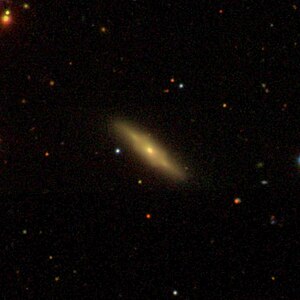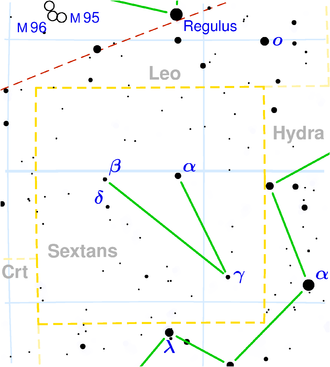NGC 3083
| Galaxy NGC 3083 |
|
|---|---|

|
|
| SDSS | |
| AladinLite | |
| Constellation | sextant |
|
Position equinox : J2000.0 , epoch : J2000.0 |
|
| Right ascension | 09 h 59 m 49.7 s |
| declination | -02 ° 52 ′ 39 ″ |
| Appearance | |
| Morphological type | Sa? |
| Brightness (visual) | 13.7 mag |
| Brightness (B-band) | 14.6 mag |
| Angular expansion | 1.1 ′ × 0.4 ′ |
| Position angle | 50 ° |
| Surface brightness | 12.7 mag / arcmin² |
| Physical data | |
| Affiliation | WBL 248 |
| Redshift | 0.021438 ± 0.000090 |
| Radial velocity | 6427 ± 27 km / s |
|
Stroke distance v rad / H 0 |
(280 ± 20) x 10 6 ly (85.9 ± 6.0) Mpc |
| history | |
| discovery | Albert Marth |
| Discovery date | January 22, 1865 |
| Catalog names | |
| NGC 3083 • PGC 28900 • CGCG 008-011 • MCG + 00-26-002 • 2MASX J09594966-0252383 • GALEX ASC J095949.70-025238.7 • LDCE 693 NED001 | |
NGC 3083 is a spiral galaxy of Hubble type Sa in the constellation Sextant south of the ecliptic . It is an estimated 280 million light years away from the Milky Way and about 90,000 light years in diameter.
The galaxies NGC 3086 , NGC 3090 , NGC 3092 , NGC 3093 are in the same area of the sky .
The object was discovered by Albert Marth on January 22nd, 1865 .
